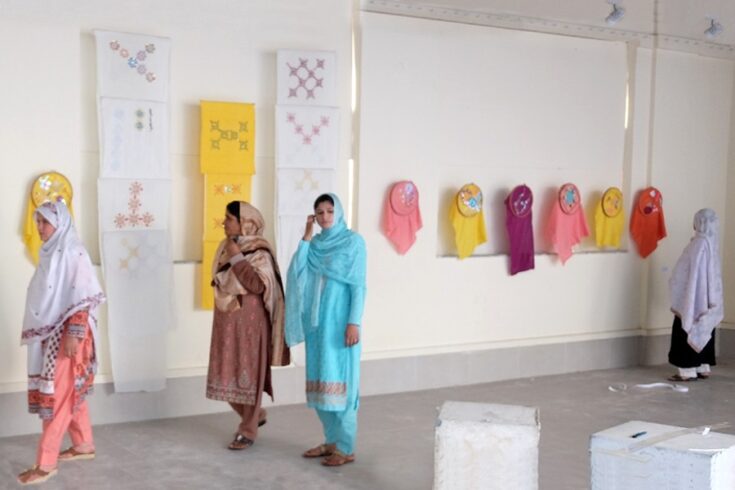Women in The Neelum Valley live within a fragile and conflict-affected region due to its geo-political location. This contested border region between India and Pakistan is heavily reliant on subsistence agriculture and handicrafts. The latter is primarily undertaken by female home-based workers.
Led by Dr Neelam Raina from Middlesex University, the research project ‘The Value of Culture in Conflict’ worked with local non-governmental organisation (NGO) SABAH to support female design entrepreneurs in the Neelum Valley.
The project enabled women to develop their craft practices through training, peer-to-peer learning and knowledge exchange with other practitioners. This gives them the opportunity to generate their own sustainable incomes. The project provided tailored solutions through inclusive and locally led approaches to help reduce poverty.
About the project
The International Labour Organisation reports that the majority (92%) of Pakistan’s female home-based workers are classified within the category of ‘Other crafts and related trades’. This project focused on new approaches that understand and value culture as essential to building peace, supporting livelihoods and helping fragile, conflict-ridden communities become more resilient and empowered.
Funded through the Partnership for Conflict, Crime and Security Research (PaCCS), this multidisciplinary project was co-funded by the Arts and Humanities Research Council (AHRC) and the Economic and Social Research Council (ESRC). Bringing together gender studies, research on conflict transformation and peace building with design, the project offered an alternative approach to building sustainable livelihoods in areas affected by conflict.
Dr Raina’s research and activities have generated interest from a number of NGOs and institutions whose work addresses violent extremism through economic empowerment, both within the region and further afield.
“We wanted to see how women in conflict areas use their cultural and coded, tacit knowledge to respond to the conflict in which they live and to support their socio-economic empowerment,” she explained.
“Men respond differently to conflict than women; the bulk of responsibility of peace-building is often placed on the women of the region, exacerbating previously existing inequalities.”
Impacts of the project
To date, a total of 32 women have received training in design and business skills which has included:
- head trainers from villages in Neelum Valley (Kashmir)
- craftswomen from Balochistan
- the NGO management teams who have then in turn taught other women within the community.
Building capacity with local NGOs has also widened the reach and ensured the sustainability of the benefits of the research project.
Within design systems in most developing economies, tradition has tended to outweigh innovation, and experimentation is viewed by home-based workers as wasteful and risky. However, the returns from innovation can be significant for livelihoods and confidence.
The project empowered women to approach design elements of colour, line, shape, space and form. It created a safe space to experiment, explore and apply alternative design methods to widen their repertoire of products.
Craftswomen now know how to apply traditional embroidery skills used for embellishing womenswear on new and varied products such as bags and scarves. This is what they had indicated as a target and ambition from their training.
The pieces that resulted from the project were showcased at the National College of Arts Rawalpindi, inaugurated by Pakistan’s Federal Minister of Education in October 2017. This exhibition was also installed at the British Academy in London in May 2018.
Find out more
Read The value of culture in conflict: investigating the sustainable livelihood generation for craftswomen in Azad Kashmir (Pakistan) on Gateway to Research.
Read Using crafts to heal the scars of conflict on DAWN.com
Top image: Fabric creations by women from the Neelum Valley, showcased at the National College of Arts Rawalpindi.

